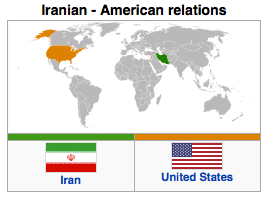Iran And The US Presidential Debate – Analysis
By IPCS
By Shubhra Chaturvedi
With the American Presidential election scheduled for 6 November 2012, it is important to critically analyse the stand taken on Iran during the final presidential debate. Is Iran the permanent engagement tool for the US in domestic and international politics?
Dealing with Iran

Discussions during the three US presidential debates ranged from domestic to foreign policy oriented issues. The strategy to deal with Iran, one of the ‘six outposts of tyranny’ as claimed by Condoleezza Rice in 2005, has consistently remained a striking issue in the US presidential debates. With the containment of a nuclear Iran being a burning concern, there was an expectation that it would be pragmatically discussed in the third debate.
However, it was dealt with in the most unrealistic way. There were claims by both incumbent President Barack Obama and Republican nominee Mitt Romney that the US would be a friend to Iran, despite their actual strategies and proposed executions suggesting otherwise. At the last presidential debate held in Florida that dealt with the re-shaping of US foreign policy, both Obama and Romney claimed that they supported engagement with Iran. They stated that they would like to resolve the issue with Iran with the help of bilateral negotiations. At the same time, they made their stands clear in case Iran decided to attack Israel. Mitt Romney stated in The Jerusalem Post , “if Israel is attacked, we have their back, not just diplomatically, not just culturally, but militarily.” Though he also claimed America’s purpose “is to make sure the world is peaceful. We want a peaceful planet… I want to see peace…”, his plans, however, highlighted the worst case scenario much more than the peaceful resort.
Initially, there were technical differences between the two candidates regarding the thresholds with respect to the nuclear programme development in Iran. While Obama was against nuclear weapon development in Iran, Romney is against the enrichment of uranium or rather, against the capability itself. Eventually, even Obama recalibrated his stand and stated that Iran would have to end its nuclear programme and while doing so, did not clarify any distinctions between the two.
Iran: Just a Nuclear State?
Throughout the debate, the discussion on Iran and US policy towards it was just confined to its nuclear programme. Republican Romney sold himself with claims that his election and policies of stricter sanctions and diplomatic isolation towards Iran was the only way to prevent the country from developing a nuclear programme. Obama boasted of the strict and ‘crippling’ sanctions that have already been imposed on Iran to keep a check on the country’s nuclear ambitions. Romney stated that Iran, which is “the greatest national security threat to the US”, has been inching closer towards a nuclear weapon ever since Obama came into office. Obama however, continued to hold his stand stressing that “Iran will not get a nuclear weapon.” The mood of the debate on the discussion over Iran was quite similar to the way previous talks have shaped up. It was, as usual, a process of scoring brownie points and engaging with voters whilst no reference was given to the state of Iranian instability or suffering economy as a result of the sanctions.
The Moscow talks held in July 2012 between Iran and the P5+1 clearly indicated that there were “significant gaps between the substance of the two (candidates’) positions” as observed by Catherine Ashton (The Washington Post, 20 June 2012). Though both candidates discussed how to deal with the worst case scenarios and how good they were in handling the Iranian condition, neither of them talked about any initiatives to reduce the gaps between the different positions of the two countries on a nuclear programme. A similar situation came up during the debate too. Like every other initiative towards talks between Iran and the US, the presidential debate too witnessed the analysis of Iran in a superficial manner with a focus only on its nuclear programme, engagement with Ahmadinejad (not Ayatollah Khamenei), and ideas like further tightening of sanctions on the country. The aspects of Iran that were discussed and the statements and defenses made regarding these, were of a provocative nature rather than anything productive or substantial.
The discussion, devoid as it was of any serious plans or strategies, is a clear indication of the little relevance that Iran as a state enjoys in the course of action of US foreign policy. It should be realised that it is impossible to isolate real threats and confine the policy to a selected realm of nuclear weapons. Talks about engagement and hypothetical plans of dealing with the country are just a dismal display of the incapability of the US to substantially deal with a serious issue like Iran. Romney might seem to think that the Iran issue should be dealt with like the Apartheid, but it is time to deal with issues as they are and move out of analogies by opting for pragmatic and productive solutions.
Shubhra Chaturvedi
Research Officer, NSP, IPCS
e-mail: [email protected]
